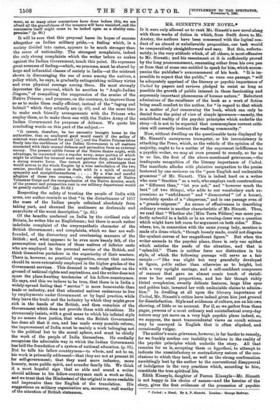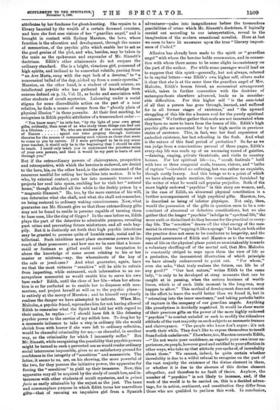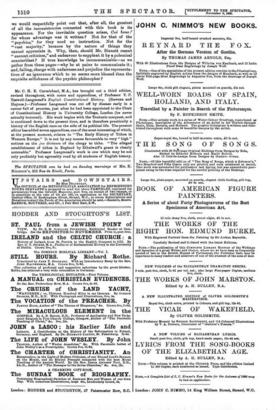MR. SINNETT'S NEW NOVEL.* Is' it were only allowed us
to rank Mr. Sinnett's new novel along with those works of fiction in which, from Swift down to Mr. Anstey, the authors have been concerned with the logical con- duct of an absurd or unbelievable proposition, our task would be comparatively straightforward and easy. But this, unfortu- nately, is the very attitude which, of all others, is moat offensive to Mr. Sinnett ; and his resentment at it is sufficiently proved by the long pronouncement, emanating either from his own pen or from that of some one entitled to speak for him, which accom- panies the publisher's announcement of his book. "It is im- possible to expect that the public," so runs one passage, "will be adequately apprised of the literary or psychic importance of United by papers and reviews pledged to resist as long as possible the growth of public interest in those fascinating and supremely important phenomena of human nature." Reluctant admissions of the excellence of the book as a work of fiction bring small comfort to the author, for "in regard to that which is a matter of fact concerning the book, which can only be denied from the point of view of simple ignorance—namely, the established reality of the psychic principles which underlie the story—it is. not to be expected that commonplace current criti- cism will correctly instruct the reading community."
Now, without dwelling on the questionable taste displayed by Mr. Sinnett's anonymous trumpeter, or his inconsistency in attacking the Press, which, as the vehicle of the opinion of the majority, ought to be a matter of the supremest indifference to a psychic writer, we may at once proceed to remedy, so far as in us lies, the first of the above-mentioned grievances,—the inadequate recognition of the literary importance of United. The manifesto alludes with plaintive resignation to the praise bestowed by one reviewer on the "pure English and undeniable grammar " of Mr. Sinnett. This is indeed hard on a writer who uses " function " as a verb, who employs such constructions as "different than," "let you ask," and "however much the best" (of two things), who adds to our vocabulary such ex- pressions as " unfoldment " and " dismounted " (of a house), invariably speaks of a " chaperone," and in one passage even of a " grande seigneur." An excess of effusiveness in describing ordinary events is another characteristic of Mr. Sinnett. Thus, we read that " Whether she [MiSs Terra Fildare] was more per- fectly splendid in a habit or in an evening-dress was a question which might have left room for argument on both sides." Else- where, too, in connection with the same young lady, mention is made of a dress which, " though loosely made, could not disguise the opulent curves of her magnificent figure." But when the writer ascends to the psychic plane, there is only one epithet which satisfies the needs of the situation, and that is "splendid." There is neither force nor distinction in his style, of which the following passage will serve as a fair sample :—" She was slight but very gracefully developed in figure, petite rather than otherwise as to height, but with a very upright carriage, and a self-confident composure of manner that gave an almost comic touch of stateli- ness to her small proportions, and her fair though richly tinted complexion, sweetly delicate features, large blue eyes and golden hair, invested her with undeniable claims to admira- tion." In dwelling at all upon the literary importance of United, Mr. Sinnett's critics have indeed given him just ground for dissatisfaction. Style and evidences of culture, are on his own showing, of little or no account. For if, as we gather from these pages, persons of a most ordinary and unintellectual every-day nature may yet move on a very high psychic plane indeed, so, we suppose, the most transcendental views on occult science may be conveyed in English that is often slipshod, and occasionally vulgar.
The author's main grievance, however, is far harder to remedy, for we frankly confess our inability to believe in the reality of the psychic principles which underlie the story. All that remains for us is, accepting them ex hypothesi, to attempt to indicate the unsatisfactory or contradictory nature of the con. elusions to which they tend, as well as the strong confirmation unwittingly lent by the author to the conventional disapproval of indulgence in the very practices which, according to him, constitute the true spiritual life.
Edith Kinseyle, daughter of Ferron Kinseyle—Mr. Sinnett is not happy in his choice of names—and the heroine of the story, gives the first evidences of the possession of psychic
• United: a Novel. By A. P. Sinnott. London : George Redraw.
attributes by her fondness for ghost-hunting. She repairs to a library haunted by the wraith of a certain deceased countess, and here she first sees visions of her " guardian angel," and is brought in contact with Sydney Marston, the hero, whose function is the education and development, through the means of mesmerism, of the psychic gifts which enable her to act as the good genius of the plot, and who, besides, may be taken in the main as the spokesman and expounder of Mr. Sinnett's doctrines. Edith's other attainments do not surpass the ordinary standard. She is a bright, vivacious girl, possessed of high spirits, and inclined to be somewhat volatile, passing from "an Ave Maria, sung with the rapt look of a devotee," to " a nonsensical ballad of the day, picked up from a comic operetta." Marston, on the other hand, is a student of occult science, an intellectual psychic who has gathered his knowledge from sources defined on p. 54, Vol. II., as books and association with other students of occult mysteries. Labouring under a social stigma for some discreditable action on the part of a near relative, he finds a means of escape from the " ghastly plain of physical illusion " in these pursuits. At their first meeting, he recognises in Edith psychic attributes of a transcendent order :—
" Yon know more," he tells her, " by the light of your own great gifts, evidently, than most of us who study these things can find out
in a lifetime We, who are students of the occult mysteries of Nature spend our time groping through intricate
theories for the means of compassing such visions as those that seem to come to you by nature. If I were privileged to be in any sense your teacher, it would only be in the beginning that I should be able to teach. I could only teach you to understand the priceless value of your own powers, and then it would be my part to learn of and through you."
But if the extraordinary powers of clairvoyance, prospective and retrospective, with which the heroine is endowed, are denied to the hero, his, on the other hand, is the entire command of the resources needful for setting her faculties into motion. It is he who, by external contact, puts her into mesmeric trances and projects her soul into space, enabling her to visit her " natural home," though attached all the while to the fleshly prison by a "magnetic filament." He, too, by the mere exercise of his will, can determine what she shall, and what she shall not remember, on being restored to ordinary waking consciousness. Now, what guarantee can Mr. Sinnett give us that these extraordinary gifts may not be found to reside in persons capable of turning them to base uses, like the ring of Gyges ? In the case before us, Edith plays the part of the detective to admirable purpose, revealing past crime and preventing future misfortune, and all ends hap- pily. But it is distinctly set forth that high psychic intuitions may be granted to persons quite of humble rank, social and in- tellectual. Such intuitions must place enormous powers in the reach of their possessors ; and how can we be sure that a house- maid or footman so gifted could resist the temptation to abuse the knowledge of some secret relating to his or her master or mistress,—say, the whereabouts of the key of the safe or jewel-case ? And what guarantee, again, have we that the most virtuous " sensitive" will be able to refrain from imparting, while entranced, such information to an un- scrupulous mesmerist as would enable him to serve his own base ends ? Edith, until the close of her life—when her educa- tion is so far perfected as to enable her to dispense with mes- merism, and project herself at will on to the psychic plane— is entirely at the mercy of Marston ; and he himself very clearly
realises the danger we have attempted to indicate. When Mrs.
Malcolm, a psychic friend, reproaches him for not having allowed Edith to remember what the Spirit had told her with regard to their union, he replies :—" I should have felt it like debasing psychic power to the service of my selfish love. To drag her by a mesmeric influence to take a step in ordinary life she would shrink from with horror if she were left to ordinary reflection, would be shameful criminality for me,—as shameful, in another way, as the criminality for which I innocently suffer." But Mr. Sinnett, while recognising the possibility that psychic powers might be turned to such a perverted use as would render ordinary social intercourse impossible, gives us no satisfactory ground for confidence in the integrity of "sensitives " and mesmerists. The latter, it seems to us, are, on his showing, the more powerful of the two, for they possess the initiative power, the apparatus for forcing the " sensitives" to yield up their treasures. Now, this apparatus may all be acquired by the study of occult lore, and in-
tercourse with other students of occult mysteries, and is prima fade as easily attainable by the unjust as the just. The tame and commonplace purpose to which Edith turns her marvellous gifts—that of rescuing an impulsive girl from a Spanish adventurer—pales into insignificance before the tremendous possibilities of crime which Mr. Sinnett's doctrines, if logically carried out according to our interpretation, reveal to the imagination of the modern sensational novelist. Here at last we seem to have lit unawares upon the true " literary import- ance of United."
Allusion has already been made to the spirit or "guardian angel" with whom the heroine holds communion, and in connec- tion with whom there seems to be some slight inconsistency on the part of the author. For while some passages would lead us to suppose that this spirit—generally, but not always, referred to in capital letters—was Edith's own higher self, others make it clear that she is at the same time the guardian angel of Mrs. Malcolm, Edith's bosom friend, an economical arrangement which, taken in further connection with the doctrine of metempsychosis elsewhere advanced, lands us in consider-
able difficulties. For this higher self " is the sum-total of all that a person has gone through, learned, and suffered for in all former stages of existence," and " the upward struggling of this life fits a human soul for the purely spiritual existence." We further gather that souls are not incarnated when they have no more to learn from the lesson of life. Edith's high psychic gifts are accounted for by her high merits in previous states of existence. This, in fact, was her final experience of embodied existence, her last schooling in the flesh. And what is the nature of this final period of probation P So far as we can judge from a conscientious perusal of these pages, Edith's every-day life was made up of an unceasing round of gaieties, —dancing, singing, private theatricals, and visite to country houses. For her spiritual life—i.e., " occult festivals " held with two or three congenial souls, trances, visions, and " baths of rapture "—involved no suffering, but was rather an exquisite, though costly luxury. And this brings us to a point of which we have already made mention, the confirmation furnished by the writer of what he would call popular prejudice. Both of the more highly endowed " psychics " in this story are women, and, in the case of Edith, an abnormal physical constitution is a further accompaniment of high psychical gifts. Marston, too, is described as being of inferior physique. Not only, then, would the possession of the gifts in question seem to be a con- comitant of abnormal or defective constitutions, but we also gather that the longer " psychics " indulge in " spiritual life," the more unfit or disinclined do they become for the practical or every- day life. The " sensitive " draws off the vital energy of the mes- merist in streams," sopping it like a sponge." In fact, on both sides the practice does not seem to be conducive to longevity, and the repeated assurances of Edith and Marston as to the worthless- ness of life on the physical plane point so unmistakeably towards a voluntary shuffling-off of the mortal coil, that Mrs. Malcolm is constantly obliged to urge upon them the view of life as a probation, the inconsistent illustration of which principle we have already endeavoured to poiut out. " For whom," even she asks, " that truly realises the future, can life be of any good ?" "Our best nature," writes Edith to the same lady, " is only to be developed at stray moments that can be caught at in passing, when the serious business of world- liness, which is of such little moment in the long-run, may happen to allow." This method of development does not consist in the effort to leave the world better than we found it, but in " retreating into the inner sanctuary," and taking periodic baths of rapture in the company of our guardian angels. Anything like proselytism is decidedly negatived. It would be sheer waste of their precious gifts on the power of the more highly endowed " psychics " to combat unbelief or seek to modify the ridiculous attitude of the vast majority on such subjects as mesmeric trances and clairvoyance. "The people who know don't argue : it's not worth their while. They don't like to expose themselves to insult from foolish unbelievers." Elsewhere, too, Marston counsels Edith, —" Do not waste your confidence, as regards your own inner ex- periences , on people, however good and entitled to your affection in other ways, who take up that attitude you spoke of, of incredulity about them." We cannot, indeed, be quite certain whether incredulity is due to a wilful refusal to recognise on the part of the vast majority the existence of the divine element in them, or whether it is due to the absence of this divine element altogether, and therefore to no fault of theirs. Anyhow, the number of " psychics " is not Wady to increase, and, if the work of the world is to be carried on, tbie is a decided advan- tage, for in action, sentiment, and constitution they differ from those who are qualified to perform this work. In conclusion, we would respectfully point oat that, after all, the greatest of all the inconsistencies connected with this book is its appearance. For the inevitable question arises, Cui bond ? for whose advantage was it written ? Not for that of the "psychics," for they need no instruction. Not for the "vast majority," because by the nature of things they cannot appreciate it. Why, then, should Mr. Sinnett resent " current criticism," and endeavour to supplant it by a polemical counterblast ? If true knowledge be incommunicable—as we gather from these pages—why be at pains to communicate it ; and, failing, charge with unfairness and prejudice the representa- tives of an ignorance which to us seems more blessed than the exquisite selfishness of the psychic philosopher ?
















































 Previous page
Previous page